Machine learning is transforming business operations. This innovative technology has moved beyond the hype and delivered real-world results across industries. Yet many companies are still not leveraging its full potential. Machine learning is not magic but practical solutions to drive impact.
You likely use machine learning-powered apps daily without realizing it. The movie recommendations on Netflix, personalized ads while browsing, and voice assistants answering queries - are all made possible by machine learning. This technology detects patterns in data to make decisions and continuously improves through experience, no explicit programming is needed.
While often seen as a complex and abstract concept, machine learning has tangible benefits for business. It can optimize supply chains, predict demands, automate tasks, and delight customers with personalized experiences. Unassuming yet powerful, it quietly works in the background to cut costs and provide a competitive advantage.
This guide cuts through the complexity to reveal machine learning’s pragmatic value.
Read on to understand how Machine learning can transform businesses in 2024
Understanding Machine Learning
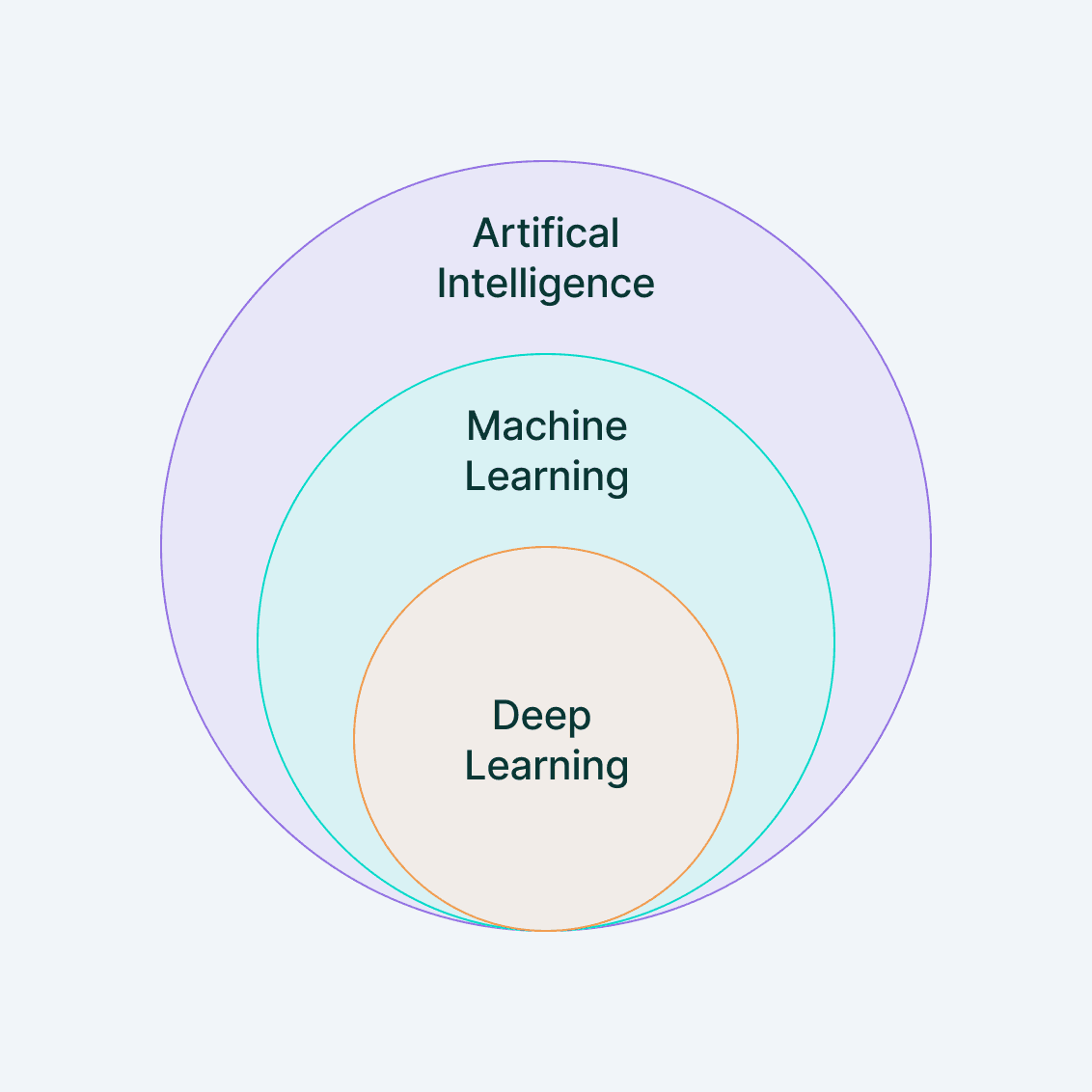
Machine learning is the capacity of computer systems to learn via experience without explicit programming.
It is an artificial intelligence (AI) program that automatically allows systems to learn and improve based on their experiences.
Machine learning techniques allow computer systems to improve their performance on a certain activity automatically as they get more data.
How Machine Learning Works?
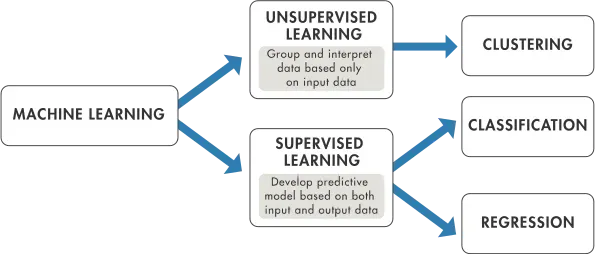
Machine learning development models learn from data by identifying patterns and relationships in the information.
The models are fed a significant quantity of data and then make predictions or judgments based on it. The more data the model receives, the better it grows at generating accurate predictions.
There are three major kinds of machine learning:
Supervised Learning: The model is trained on labeled data. This suggests that the data is already classed or has a predetermined consequence. The model learns to spot patterns in data and generates predictions about future data.
Unsupervised Learning: The model is trained on data that has not been labeled. The model detects patterns and correlations in data without understanding what it represents.
Reinforcement Learning: In reinforcement learning, the machine learning development model learns by trial and error. The machine is given a task and learns to take certain actions that maximize its reward.
Types of Machine Learning Algorithms
There are numerous machine learning algorithms, each suited for different data types and tasks. Some of the most common algorithms include:
Linear Regression: Linear regression models the relationship between two continuous variables. The model calculates a line of best fit that predicts the value of one variable based on the other.
Decision Trees: Decision trees use a tree-like structure to represent decisions and their possible consequences. The algorithm creates a model based on the data by splitting the data into subsets based on the most significant variables.
Neural Networks: The human brain's architecture is the neural network model. They comprise several tiers of interconnected nodes that process and send data.
Examples of Machine Learning Applications
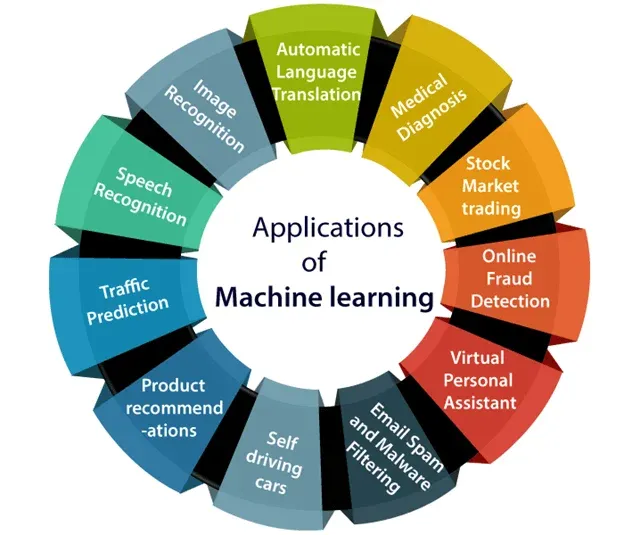
Machine learning has numerous applications across various industries, from retail to healthcare and finance.
Here are some examples:
Image Recognition: A machine learning development model can recognize objects in images. Image recognition has applications in security, healthcare, and retail, among other industries.
Fraud Detection: Machine learning can be used to detect fraudulent transactions. The model learns what normal and abnormal transactions look like and flags any suspicious activity.
Recommendation Systems: Recommendation systems use machine learning to recommend products or services to users based on their previous activities. This has applications in e-commerce, entertainment, and social media.
Next, we will cover the benefits of Machine Learning development model for Businesses.
Benefits of Machine Learning for Businesses
Nowadays, machine learning is an essential tool for companies in various sectors, thanks to the data-driven world.
Machine learning offers several advantages that have the potential to completely change the way organizations function and prosper by utilizing algorithms and data analysis. This section examines a few of the main benefits of machine learning.
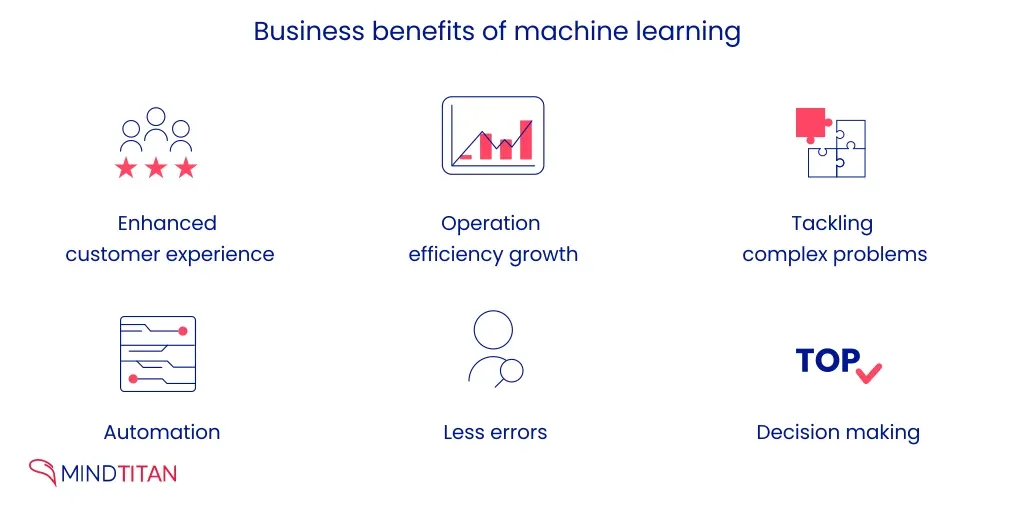
Improved decision-making through data analysis
Machine learning's capacity to swiftly and reliably evaluate enormous volumes of data is one of its biggest benefits.
Machine learning may uncover hidden patterns and important insights from data by using complex algorithms.
This enables companies to stop depending entirely on gut feeling or prior experiences and instead make well-informed decisions based on data-driven facts.
Both organized and unstructured data from a variety of sources, including as consumer information, industry trends, and rivalry, may be processed and analyzed using machine learning models.
Using this wealth of information, businesses can gain a deeper understanding of consumer preferences, market demands, and potential risks.
This, in turn, enables them to make more accurate predictions, optimize operations, and identify new growth opportunities.
Enhanced customer experience and personalization
Effective customer experience management is vital to the success of any business.
Machine learning can greatly enhance the customer experience by enabling personalized recommendations, tailored marketing campaigns, and seamless interactions.
Businesses may provide targeted advertisements, tailored offers, and personalized product suggestions using machine learning algorithms to examine client behaviors, preferences, and historical interactions.
In addition to raising consumer pleasure, this degree of customization also raises conversion and retention rates.
Additionally, chatbots and virtual assistants may be used by machine learning to automate customer support procedures.
These clever technologies can comprehend and react to consumer queries quickly, offering a 24/7 service that improves the entire customer experience.
Now, if you want to begin with machine learning development to enhance your customer service but have no clue about how to do it, then check out the NO-CODE chatbot platform, named BotPenguin.
With all the heavy work of chatbot development already done for you, BotPenguin allows users to integrate some of the prominent language models like GPT 4, Google PaLM, and Anthropic Claude to create chatbots that are powered by machine learning for platforms like:
- WhatsApp Chatbot
- Facebook Chatbot
- Wordpress Chatbot
- Telegram Chatbot
- Website Chatbot
- Squarespace Chatbot
- Woocommerce Chatbot
- Instagram Chatbot
Increased efficiency and cost savings
Machine learning can significantly improve operational efficiency and reduce costs by automating repetitive and time-consuming tasks.
Using machine learning algorithms, businesses can streamline processes, eliminate human errors, and free up resources to focus on more strategic initiatives.
For example, in manufacturing, machine learning models can optimize production schedules, forecast demand, and detect anomalies in real-time. This enables businesses to minimize inventory costs, reduce downtime, and improve production efficiency.
In addition, machine learning can automate data entry, cleansing, and analysis tasks, saving countless hours of manual work.
By automating these processes, businesses can allocate resources more effectively and redirect employees to tasks that require human expertise and creativity.
Suggested Reading:
Competitive advantage in the market
Gaining a competitive advantage is essential for firms to succeed in a highly competitive market. Businesses can set themselves apart from the competition and maintain an advantage thanks to machine learning.
Businesses may foresee consumer wants, rival tactics, and market trends by utilizing machine learning-based predictive analytics.
This enables businesses to proactively modify their products, advertising efforts, and corporate plans in order to satisfy changing client demands and keep a step ahead of the competition.
Furthermore, machine learning can help businesses uncover untapped market segments and identify emerging opportunities.
Businesses may find new client groups, specialized markets, or cutting-edge goods and services that can provide them a competitive edge by employing data analytics and pattern recognition.
Next, we will cover future trends in Machine Learning for Businesses.
Future Trends in Machine Learning Development for Businesses
Machine learning technology has witnessed significant advancements in recent years, revolutionizing the way businesses operate and make decisions.
As we look to the future, several key trends are emerging to shape the landscape of machine learning development for businesses. In this section, we will explore these trends and their implications.
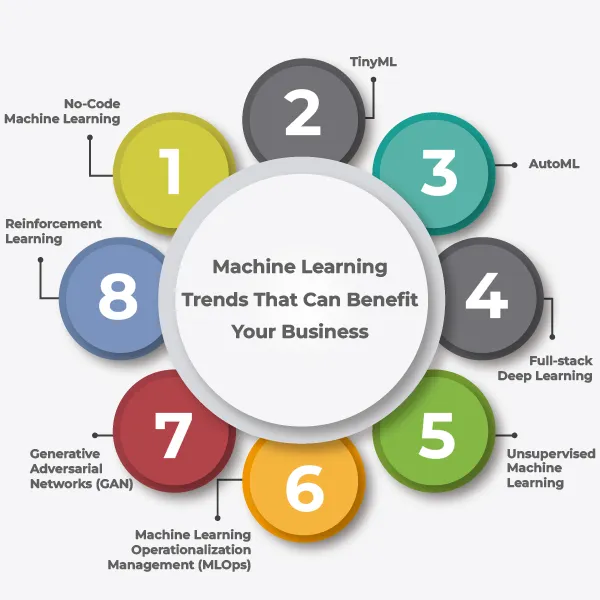
Increased Adoption of Automated Machine Learning (AutoML)
Automated Machine Learning (AutoML) is a trend that is gaining momentum in the business world.
AutoML aims to automate the end-to-end process of developing machine learning models, including data preprocessing, feature selection, model optimization, and hyperparameter tuning.
This eliminates the need for extensive manual involvement, making machine learning more accessible to businesses without a dedicated data science team.
By simplifying and democratizing the machine learning process, AutoML empowers businesses to leverage the power of machine learning in their operations.
It reduces the barriers to entry and allows organizations to extract valuable insights from their data without needing extensive expertise.
Integration of Machine Learning with Edge Computing
Edge computing is another trend that is set to impact the future of machine learning development for businesses.
Edge computing involves processing and analyzing data closer to the source, reducing latency and bandwidth requirements. By combining edge computing with machine learning, businesses can harness real-time insights and make faster decisions.
Integrating machine learning with edge computing allows for more efficient and scalable deployment of machine learning models.
It enables real-time data analysis and decision-making at the network's edge, eliminating the need to send data to a centralized server for processing.
This is particularly valuable in scenarios where real-time predictions or autonomous decision-making is required, such as in autonomous vehicles or Internet of Things (IoT) applications.
Suggested Reading:
Machine Learning vs Deep Learning vs AI: Which has the most potential?
Explainable AI for Enhanced Transparency and Trust
As machine learning becomes more prevalent in business operations, there is a growing need for transparency and trust in AI systems. Explainable AI (XAI) addresses this need by providing interpretable explanations for the decisions made by machine learning models.
XAI techniques allow businesses to understand the reasoning behind a model's predictions, providing insights into how the model arrived at a particular conclusion. This is especially crucial in industries where decisions have high stakes, such as healthcare, finance, and legal sectors.
By incorporating XAI techniques into machine learning development, businesses can enhance transparency, improve model interpretability, and build trust with stakeholders. This, in turn, enables better decision-making, regulatory compliance, and accountability.
Continued Growth of Deep Learning
Deep learning is a kind of machine learning that simulates the neural networks seen in the human brain. It has been more popular in the last few years.
As companies realize the value of deep learning in resolving intricate issues and gleaning insights from massive amounts of data, this trend is anticipated to continue.
Natural language processing, recommendation systems, and picture and audio recognition are areas where deep learning algorithms shine.
Unlike conventional machine learning techniques, they can automatically learn hierarchical representations from data.
Deep learning algorithms have the potential to become increasingly more accurate and potent as computing power and data volumes rise, giving organizations the ability to gain deeper insights and provide more accurate forecasts.
Conclusion
Machine learning is not magic. Behind the AI hype lies practical solutions to drive real impact for your business.
As this guide has shown, machine learning delivers tangible benefits - from optimizing operations to delighting customers. Unlock its potential to boost your bottom line.
While the technology continues advancing at breakneck speed, take an agile approach. Start small, focus on pain points, and scale from there. Measure and learn.
Leverage machine learning’s self-improving nature to create lasting competitive advantage. Lead your industry by embedding intelligence into processes and offerings.
The future belongs to those who harness the patterns in their data to make smarter decisions today. Will it be you?
Suggested Reading:
What Are the Applications of Machine Learning in Different Sectors
Frequently Asked Questions (FAQs)
How does machine learning benefit business operations and efficiency?
Machine learning optimizes operations by automating tasks, analyzing data for insights, and improving overall efficiency.
Can machine learning development enhance decision-making processes in business?
Yes, machine learning development model enables data-driven decision-making by providing valuable insights and predictive analytics for informed choices.
What industries can benefit the most from integrating machine learning into their business strategies?
Industries such as finance, healthcare, marketing, and manufacturing can significantly benefit from integrating machine learning development model for improved processes and outcomes.
How can small businesses leverage machine learning for growth and competitiveness?
Small businesses can use machine learning development model to automate tasks, personalize customer experiences, and gain a competitive edge through data-driven strategies.
What role does machine learning play in customer relationship management (CRM) for businesses?
Machine learning in CRM enhances customer interactions by predicting preferences, automating communication, and improving overall customer satisfaction.
What impact does machine learning have on marketing strategies and customer targeting?
Machine learning development model enhances marketing strategies by analyzing customer behavior, enabling personalized campaigns, and optimizing targeting for better engagement.

